All courses listed here will count towards students’ Honors coursework requirements for Global and International Honors. Please double-check the course attributes before registering and talk with your primary advisor to ensure your course selections best meet your needs.
Students in Global Honors have the option of completing Honors Course Contracts to enhance courses to the Honors level if they wish to earn Honors in the spring but are not interested in/unable to fit the below-listed courses. Contract proposals are due Monday, February 3, 2025.
Students in Disciplinary Honors interested in taking one of these courses should check with their Honors Liaison, major advisor, and Honors advisor to ensure the course will count toward degree/Honors requirements.
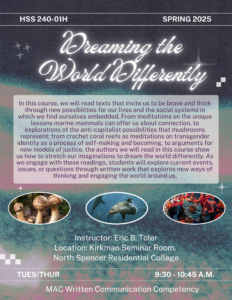
MAC Written Communication (MWC)
TR 9:30 a.m.—10:45 a.m.
Instructor: Eric B. Toler
CRN: 12295
Seats: 20
North & South Spencer Residential College
Creating a new vision of our world takes time, thought, and effort. As we navigate broken systems, disconnected communities, and systemic disenfranchisement, it also takes tremendous courage to imagine what could be different about the ways we engage ourselves, each other, and the earth. In this course, we will read texts that invite us to be brave and think through new possibilities for our lives and the social systems in which we find ourselves embedded. From meditations on the unique lessons marine mammals can offer us about connection, to explorations of the anti-capitalist possibilities that mushrooms represent; from crochet coral reefs as meditations on transgender identity as a process of self-making and becoming; to arguments for new models of justice, the authors we will read in this course show us how to stretch our imaginations to dream the world differently. As we engage with these readings, students will explore current events, issues, or questions through written work that explores new ways of thinking and engaging the world around us.
A central feature of this course is the journey we will embark on related to reading and writing. Through reflexivity journals and in-class workshops, we will explore researching/reading/writing as embodied processes, asking what happens within our bodies as we do this work. You will gradually build your research paper throughout the semester, as you play with the written word, engage in peer feedback exercises, and reflect on your own identity as a writer/researcher/scholar.
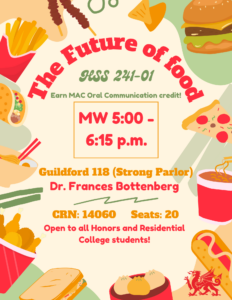 HSS 241-01:
HSS 241-01:MAC Oral Communication (MOC)
MW 5:00 p.m. — 6:15 p.m.
Instructor: Frances Bottenberg
CRN: 14060
Seats: 20
Strong Residential College
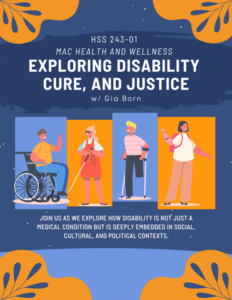 HSS 243-01:
HSS 243-01:MAC Health and Wellness (MHW)
MW 3:30 p.m.—4:45 p.m.
Instructor: Gia Born
CRN: 12296
Seats: 20
North & South Spencer Residential College
What do we mean when we say disability? Should cure be the goal?
This course critically examines the complex interplay between disability, concepts of cure, and societal structures through an intersectional lens. Students will explore how disability is not just a medical condition but is deeply embedded in social, cultural, and political contexts.
Key topics include:
Through readings, discussions, and critical analyses, students will engage with case studies, personal narratives, and theoretical frameworks that highlight the diverse experiences of disabled individuals. The course aims to foster a nuanced understanding of how societal norms influence perceptions of disability and the ongoing debates surrounding cure and acceptance. By the end of the course, students will be equipped to critically assess policies, practices, and cultural representations related to disability in a rapidly changing world.
MAC CritThink Hum and Fine Art (MHFA)
TR 11:00 a.m. —12:15 p.m.
Instructor: Michael Pittard
CRN: 12297
Seats: 20
Ashby Residential College
In an age of incredible, unprecedented access to art, literature, music, and other forms of media, everybody is indeed a critic. The Internet is awash with criticism of all types of media from all sorts of positions, from Rotten Tomatoes to BookTok to YouTube video essayists. Some of the criticism is cutting, fresh, and contemporary, but most is shallow, ideologically motivated, or promotes anti-intellectualism. What does it mean to practice criticism in a time that wants everything to be rated, aggregated, and consumed by every possible audience without critical thinking?
In this class, students will begin their “critical” careers by asking these hard questions. Through seminar discussions, reflection writings, readings, and their own criticism projects, students will gain skills in analyzing current and historical texts of varying mediums, appraising their value based on self-developed criteria, and submitting their criticism for publication at an outlet of their choosing. To be a critic is not about defending high culture from low, or constructing a canon of “classics,” but to, as the writer, poet, and critic A.V. Marraccini puts it: “burrow into sweet, dark places of fecundity, into novels and paintings and poems and architectures, and…make them their own.”
MAC CritThink Hum and Fine Art (MHFA)
TR 12:30 p.m.—1:45 p.m.
Instructor: Chrissy Flood
CRN: 12298
Seats: 20
Ashby & South Spencer Residential Colleges
In this seminar, we will look at issues of power, oppression and interpersonal relationships in American History as depicted in popular film, including Birth of a Nation, Gone with the Wind, Grapes of Wrath, Casablanca, Pearl Harbor, The Butler, and 13 Days. We will context and critique the films on their historical storytelling.
It is important to note that this is neither a course about technical film production nor about performance critique. Rather, we will look at films as a mirror of the society they reflect and debate whether the films create, rather than reflect, public perception and historical understanding. Questions at which we will look closely include the depictions of “haves and have-not’s,” social politics and political power.
MAC CritThink Hum and Fine Art (MHFA)
MWF 11:00 a.m. —11:50 a.m.
Instructor: Larry Lavender
CRN: 12299
Seats: 20
Strong Residential College
In this course we explore the “human-animal” divide as it shapes our beliefs about and attitudes toward the natural world in general, and toward non-human animals in particular. We consider the ethics of myriad personal, political, and industrial activities involving non-human animals, and share points of view on any “rights” such creatures do or should possess. Finally, we delve into the use and representation of non-human animals in artistic works. I look forward to working with students who wish to engage with complicated questions for which there are no final answers.
 HSS 244-04:
HSS 244-04:MAC CritThink Hum and Fine Art (MHFA)
MW 2:00 p.m. —3:15 p.m.
Instructor: Nodia Mena
CRN: 12300
Seats: 20
This course delves into the cultural heritage of Afro-descendants in Latin America. We will critically analyze their social positions and relations in order to help you draw connections between the United States and global societies.
South Spencer Residential College
MAC CritThink Hum and Fine Art (MHFA)
TR 11:00 a.m.—12:15 p.m.
Instructor: Matthew Reese
CRN: 12301
Seats: 20
Ashby Residential College
The prima donna is considered the cornerstone for an exquisite operatic cast. With mellifluous tones, soaring high notes, total vocal control and dramatic flair, there is a reason why this type of singer is revered by composers and adored by audiences. In this course we will explore the accomplishments and contributions of black women in the opera field that are often overlooked. Additionally, we will discuss the core themes of the critical black feminist thought and the parallelism that occasionally appears through the casting of black women in particular operatic roles.
This course will initially start with an introduction of different types of classical vocal genres (opera, oratorio, art song), performance etiquette, and identification of the various vocal classifications through the German fach system. Additionally, this course will travel through the decades to recognize some of the major singing talents that will be presented as singer profile projects by students. Through visual analyzation and thorough discussion of the divas’ performances, students will be able to identify major character roles in the repertoire such as: Tosca, Dalila, Carmen, Aïda, and Bess. Students will also be able to critically comprehend the concept of an opera synopsis along with character identification to understand what is being communicated through notable arias and other classical vocal works. It is important for students to come to the course engaged and respectful to the opinions of others as they will learn how to orally communicate fundamentals of the classical vocal arts effectively through presentation and civil discussion.
MAC CritThink Nat Sci (MNTS)
MW 2:00 p.m.—3:15 p.m.
Instructor: Meg Horton
CRN: 12302
Seats: 20
This half-semester hybrid course meets MAC Competency 8, critical thinking in the natural sciences. Explore the process of scientific reasoning through 1) hands-on engagement in designing, executing, analyzing, and presenting scientific experiments that produce empirical data used to explain natural phenomenon, and 2) Self-paced online tutorials and simulations that further explore the collection and use of data in developing theories and models in the field of Biology. In addition to a focus on critical thinking, the course activities are designed to develop transferable skills in visualizing data and communicating data-based arguments.
MAC CritThink Nat Sci (MNTS)
TR 3:30 p.m.—4:45 p.m.
Instructor: Alice Haddy
CRN: 14059
Seats: 20
Strong Residential College
One of the biggest challenges of today’s society is the shift from fossil-based fuels to alternative fuel sources. For more than a century, the industrialized world has depended on coal and petroleum energy and our way of life is deeply tied to these high-energy resources. Now the world faces declining fossil fuel resources and environmental repercussions from their past use. Meanwhile, alternative sources of energy such as solar and wind are struggling to advance sufficiently to fill the energy needs of developed countries and to support the growing demands of still-developing countries. What will the profile of our energy resources be in the future? Can future energy sources support the high-energy demand we have become used to? In this course, we will study the science of how we produce and use energy. We will develop an understanding of our past and current dependence on fossil fuels and evaluate how alternative energy resources may serve society in the future.
MAC Diversity and Equity (MDEQ)
TR 9:30 a.m.—10:45 a.m.
Instructor: Derek Skillings
CRN: 12303
Seats: 20
Strong Residential College
This course explores whether there are still any wild places left in the world and what value there is in experiencing nature, guided by readings in philosophy, ecology, nature writing, and aesthetics. We will start by reading selections from the great early American naturalists like Emerson, Thoreau, Burroughs, Muir, and Leopold, introducing feminist, indigenous, and anti-colonial voices along the way. Assignments will be place-based when possible, focusing on experiencing and writing about North Carolina or wherever else the students call home.
MAC Diversity and Equity (MDEQ)
MWF 11:00 a.m.—11:50 a.m.
Instructor: Derek Keyser
CRN: 12304
Seats: 20
Ashby Residential College
Do we control our own destiny? Does violence always beget more violence? How exactly does someone, in the words of Aeschylus, “learn from suffering”? Greek tragedians were intensely interested in these questions, as well as many others related to the nature of existence and the human condition. This course will focus on important characters, texts, and ideas that appear in the genre of Greek tragedy. The primary readings for this course will be the tragic plays themselves (translated into modern English); we will also look at ancient and modern critical scholarship discussing these plays.
MAC Diversity and Equity (MDEQ)
TR 12:30 p.m.—1:45 p.m.
Instructor: Angela Bolte
CRN: 12305
Seats: 20
Ashby Residential College
Philosophy is not necessarily the first thing that springs to mind when thinking about speculative fiction and its various sub-genres, which include science fiction, fantasy, and horror. After all, what’s philosophical about robots, wizards or an ax-wielding killer? But, speculative fiction can inspire an audience to consider the same sort of questions that philosophers have pondered for centuries and also those questions that philosophers have only recently begun to explore in earnest. Both the subtle and the ‘in your face’ messages of speculative fiction make the entire genre ripe for philosophical exploration. The distance speculative fiction provides its audience to its underlying subject matter allows us to explore from a safe distance questions and subjects that might otherwise cut us too deeply, subjects like race, gender, sexuality, and conceptions of the self. This class will look at speculative fiction in an assortment of forms including film, television, and literature in order to explore a variety of philosophical questions. Thus, students will be required to view speculative fiction not just as pure entertainment, but as offering a new way to look at serious philosophical questions.
MAC Diversity and Equity (MDEQ)
TR 9:30 a.m.—10:45 a.m.
Instructor: Dominick Hand
CRN: 10089
Seats: 5
MAC Diversity and Equity (MDEQ)
TR 12:30 p.m.—1:45 p.m.
Instructor: Dominick Hand
CRN: 10091
Seats: 5
MWF 10:00 a.m.—10:50 a.m.
Instructor: Jazmin Eyssallenne
CRN: 10092
Seats: 5
T 6:00 p.m.—8:50 p.m.
Instructor: Demetrius Noble
CRN: 10093
Seats: 5
In his seminal text Black Music, Amiri Baraka (then LeRoi Jones) contends that “Negro music is essentially the expression of an attitude, or a collection of attitudes, about the world and only secondarily an attitude about the way music is made.” Baraka argues that far too often we take for granted the social and cultural context that produced Black musicians and Black music, and that no analysis of Black music can be made—nor can Black music be completely understood—without situating it in its respective social and cultural milieus and without attending to the ideologies, power relations, and social relations that the music is responding to. Is Black music acquiescing to the status quo, reinforcing the status quo, or challenging the status quo? Which ideological wings of Black music become the most popular and celebrated and why? What does Black music have to do with Black liberation struggle?
This course will attempt to wrestle with these questions and will leverage these questions to frame our explorations and interrogations of various genres and periods of Black music in America.
ADS; CC
MWF 12:00 p.m.—12:50 p.m.
Instructor: Jazmin Eyssallenne
CRN: 10094
Seats: 5
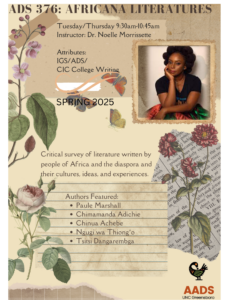
TR 11:00 a.m.—12:15 p.m.
Instructor: Noelle Morrissette
CRN: 10095
Seats: 5
Critical survey of literature written by people of Africa and the diaspora and their cultures, ideas, and experiences.
MAC Global and Intercultural (MGIL)
MWF 11:00 a.m.—11:50 a.m.
Instructor: Robyn LeBlanc
CRN: 11722
Seats: 10
The embedded honors section of this course will center around a project-based learning experience studying small finds (cups, bowls, jewelry, bags, coins, dice—anything movable!) from a city block at Pompeii, a town destroyed by a volcano in 79 CE. Students will use a database of objects found by archaeologists in the Insula of the Menander, and pick a topic or group of objects to first map onto a plan of a house or the city block, and then to analyze in their historical and archaeological contexts, noting patterns and elements which can tell us about Roman daily lives.
MAC Global and Intercultural (MGIL)
Online Asynchronous
Instructor: Jonathan Zarecki
CRN: 11723
Seats: 5
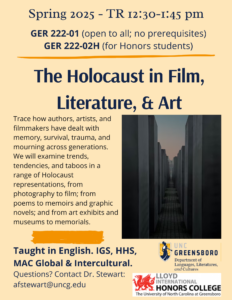 GER 222-02H:
GER 222-02H:MAC Global and Intercultural (MGIL)
TR 12:30 p.m.—1:45 p.m.
Instructor: Faye Stewart
CRN: 12614
Seats:
Trace how authors, artists, and filmmakers have dealt with memory, survival, trauma, and mourning across generations. We will examine trends, tendencies, and taboos in a range of Holocaust representations, from photography to film; from poems to memoirs and graphic novels; and from art exhibits and museams to memorials. ***Taught in English***
MWF 11:00 a.m.—11:50 a.m.
Instructor: David Wharton
CRN: 11724
Seats: 5
Continuation of GRK 101. Emphasis on advanced grammar and reading of selections from ancient Greek authors (e.g., Euripides, Xenophon, Plato, New Testament).
Prerequisites: GRK 101.
MWF 9:00 a.m.—9:50 a.m.
Instructor: Michiel Van Veldhuizen
CRN: 11725
Seats: 3
In this course, we read closely and carefully an ancient Greek play by one of the great playwrights (Aeschylus, Sophocles or Euripides) in the original language. We explore the genre of tragedy, and such topics as the chorus, actors and stagecraft, Greek gods in dramatic performances, and fate and destiny.
Prior knowledge of ancient Greek required. (UNCG offers a GRK 101-102 sequence that prepared you for this course.)
MAC Global and Intercultural (MGIL)
TR 2:00 p.m.—3:15 p.m.
Instructor: Ali, Omar
CRN: 12288
Seats: 7
Migration and African empires and political systems, the development of science, the spread of Islam, Mediterranean and Indian Ocean world contacts, the rise of the Atlantic slave trade and resistance to slavery.
MWF 10:00 a.m.—10:50 a.m.
Instructor: Robyn LeBlanc
CRN: 11726
Seats: 5
This embedded honors section will look at the practice of Roman labeling and captioning their art—called “tituli.” With the whole class we will read, translate, and discuss the Bayeux Tapestry, an 11th century tapestry depicting the Norman conquest of England with Latin tituli for each scene. Students in the honors section will then do a project composing their own tituli for a proposed “tapestry” of a Roman myth or historical event. Students will learn about an event of their choice, outline a 10-panel “tapestry” and then compose Latin captions which tell the viewer what they are seeing.
MAC CritThink Hum and Fine Art (MHFA)
GRD; MHFA; ONLC
TR 9:30 a.m.—10:45 a.m.
Instructor: Insa Lawler
CRN: 10710
Seats: 3
This course introduces you to fundamental concepts, techniques, and skills conducive to analytic, careful, evidence-based, and fair-minded reasoning. Over the course of the semester, you will gain skills in analyzing the merits and deficits of other people’s and your own arguments. You will also improve your ability to reason well and you will learn how to avoid reasoning badly.
MAC CritThink Hum and Fine Art (MHFA)
Online Asynchronous
Instructor: Insa Lawler
CRN: 10711
Seats: 3
This course introduces you to fundamental concepts, techniques, and skills conducive to analytic, careful, evidence-based, and fair-minded reasoning. Over the course of the semester, you will gain skills in analyzing the merits and deficits of other people’s and your own arguments. You will also improve your ability to reason well and you will learn how to avoid reasoning badly.
MAC CritThink Hum and Fine Art (MHFA)
TR 9:30 a.m.—10:45 a.m.
Instructor: Andrew Ruble
CRN: 10712
Seats: 3
Ethical theory and its application to business: economic justice, corporate responsibility, self-regulation and government regulation, conflict of interest, investment policy, advertising, and environmental responsibility. This course also provides critical thinking skills necessary for academic success at UNCG.
TR 6:00 p.m.—7:15 p.m.
Instructor: Andrew Ruble
CRN: 10713
Seats: 3
This course will look at classical Chinese thought and the influence it had on the surrounding region. This course will primarily survey seven main thinkers of the “classical” period of Chinese philosophy (approx. 550-221 BCE): Kongzi (Confucius), Mozi, Mengzi (Mencius), Laozi, Zhuangzi, Xunzi, and Han Feizi. These thinkers developed a complex and rich debate about ethics, human nature, moral psychology, and self-cultivation. The positions they established greatly influenced later Chinese history, including the development of Buddhism, and they influenced philosophical discourse in Japan, Korea, and Vietnam as well. Thus, understanding these early debates is an important stepping-stone for understanding East Asian thought generally. Readings will consist mainly of primary texts in translation, with some secondary literature. Near the end of the semester, this course will also look at the influence some of these great thinkers had on modern cultures in surrounding areas, like China, Korea, and Japan. No previous knowledge of Chinese language or history is necessary.
Online Asynchronous
Instructor: Insa Lawler
CRN: 10714
Seats: 3
This course is an introduction to two (families of) formal languages: propositional logic and first-order predicate logic. These languages are used to detect, understand, and evaluate recurring patterns in deductive reasoning. Recognizing and evaluating such patterns is crucial to rational thought and to constructing cogent arguments.
PHI 348-01H:
Phenomenology and Existentialism
Online Asynchronous
Instructor: Frances Bottenberg
CRN: 10715
Seats: 5